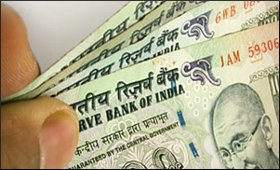|
|
|

|
Capital infusion, bad bank announcement boost banking stocks
|
|

|
|
| Top Stories |
 |
|
|
|
SME Times News Bureau | 05 Feb, 2021
The government's recapitalisation support of Rs 20,000 crore to
state-run banks, announced in the budget along with the decision to form
a bad bank, have been a major support for the investors having put
their money in the banking shares.
A recent report by Moody's
Investors Service said that the proposed asset reconstruction company
(ARC), described as a bad bank in common parlance, will resolve legacy
problem loans and will be credit positive for banking system.
The
allocation of a modest Rs 20,000 crore capital infusion for public
sector banks will help the banks to meet Basel capital requirements, but
will not boost credit growth, it added.
"We expect that the
government will continue to support public sector banks' capital needs
as it has done over the past few years," it said.
The BSE Banking index has surged 16 per cent in this week since the Union Budget for FY22 was presented on Monday.
On Friday, the index rose 360.63 points, or 0.90 per cent, to close at 40,301.81 points.
Shares
of banking giant State Bank of India (SBI) closed at Rs 393.05, higher
by Rs 37.95, or 10.69 per cent, from its previous close.
"The
government's plan to set up an asset reconstruction company (ARC) to
take over the banking system's stressed loans is credit positive for the
banks as it will help them to offload legacy nonperforming loans
(NPLs), freeing up resources to focus on new business," said the Moody's
report.
Speaking to IANS, the Finance Ministry's Chief Economic
Advisor (CEA) Krishnamurthy Venkata Subramanian had said India's growth
is set to further accelerate on the back of the path breaking plan to
set up a 'Bad Bank', which is expected to absorb Rs 2 lakh crore worth
of non-performing assets (NPA).
The Moody's report added that
while the government is yet to detail the structure of the ARC,
including its shareholders, capitalisation, and risk and return sharing
with the banks, that transferring legacy NPLs to the ARC would not
result in a material capital hit to the banks as they have largely
provided for those loans.
The pooling of stressed assets can lead
to faster resolutions, leading to better recovery rates, a credit
positive for the lenders, the report said.
However, the
government's plan to divest stakes in two public sector banks and IDBI
Bank Ltd is credit negative for the banks involved, as it will reduce
ongoing government support. Privatisation is likely to make the banks
more market oriented, which will be positive for the industry as a
whole.
|
|
|
| |
|
|
|
|
|
|
|
|
|
|
|
|
|
|
| |
| Customs Exchange Rates |
| Currency |
Import |
Export |
US Dollar
|
₹84.00
|
₹82.25 |
UK Pound
|
₹104.65
|
₹108.10 |
Euro
|
₹92.50
|
₹89.35 |
| Japanese
Yen |
₹56.10 |
₹54.40 |
| As on 25 Jul, 2025 |
|
|
| Daily Poll |
 |
 |
| Who do you think will benefit more from the India - UK FTA in the long run?
|
|
|
|
|
|
| Commented Stories |
 |
|
|
|
|
|
| |
|